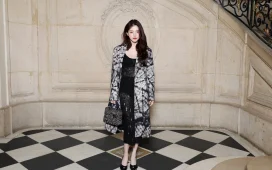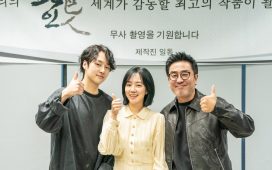Andra Day (“The United States vs. Billie Holiday”) and Leslie Odom Jr. (“One Night in Miami”) sat down for a virtual chat for Variety‘s Actors on Actors, presented by Amazon Studios. For more, click here.
The pop and soul singer Andra Day transformed her body and her sound to take on the role of a late-career icon in Lee Daniels’ “The United States vs. Billie Holiday.” The historical drama, to be released on Hulu, depicts the “Strange Fruit” singer in all her glorious ravages, with a painfully ruined voice and as targeted by government investigations but still possessed of her pride. A similar behind-the-icon act is pulled off by “Hamilton” Tony winner Leslie Odom Jr., whose Sam Cooke is a key player in the fiery debates among historical legends in Regina King’s Amazon film “One Night in Miami.”
Leslie Odom Jr.: Miss Day. I’m going to start this interview properly with a “Miss Day,” because you deserve it. Can you talk to me about your prep?
Andra Day: I basically abused my body for a long time. I’m joking and not really joking. I got the role at the very top of 2018. Reading everything I could get my hands on. Listening to every interview. Apparently, I exhausted the internet of Billie Holiday photos. Apparently, the internet will tell you that you’ve reached the end. I put my family through it; I put myself through it. I went from 163 pounds to 124 pounds. I would talk like her and I don’t drink or smoke, but I started smoking cigarettes and drinking alcohol. Not that I recommend people do this; I just was desperate because this is my first role. I just asked God to give me all of the pain and trauma. I asked him to give me her pain and give me her trauma.
Odom: What did this project give you that you needed?
Day: Fear. As simple as that sounds, fear was a huge thing I had to work through. I had to work through and work with it as well. Because she had good reason to be afraid — the fact that she was singing “Strange Fruit” with everyone coming down on her. We’re so used to protest songs now, right? We hear them all the time. We make them all the time. But we don’t know what it’s like to say, “If I sing this song tonight, I may not make it out of this club alive.”
Odom: That’s right.
Day: I can self-sabotage. I’ll find reasons why … and that’s what I tried to do with this movie. I’m like, “Oh, the timeline doesn’t work out. I don’t know if the story’s really for me.” Every day on set was working through fear. And then using my fears to help me work through her fears of facing audiences, of facing the federal government, of facing her addiction and her pain and her trauma.
Even if she had not had all that trauma in her childhood, it was traumatic enough to simply be Black back then. In order to stand on those stages and do those things, it was almost like she needed the battery in her back. She was trying more than to survive, but to thrive in virtually impossible circumstances.
Odom: Our movie, too, “One Night in Miami” — you have these big lives. Which means that it is par for the course that we’re going to see a few actors interpret these roles. The reason to keep doing it is because we look at it in the context of our time. Their lives can still speak. That’s why we tell the stories again and again about Muhammad Ali, Malcolm,
Billie Holiday.
But this one felt special to me and not only because of the nuance of your performance, but also because of the way that she’s written. Even while they were threatening to lock her up, this was a film about a liberated Black woman.
Day: For as long as she could, even with all the odds against her, she lived her life on her terms. One of my favorite quotes, and I lived by it on set, was “I didn’t want to be anybody’s damn maid.” Black women back then could only be prostitutes or could be maids.
You were reluctant to play Sam Cooke, is that correct?
Odom: Every now and again, someone sees something in you that you don’t see in yourself. And that was what Regina [King] saw. Regina, thank God, saw something in me before I saw it. It just didn’t seem wise. I love Sam, but it’s too risky. I could be a bad Sam Cooke. Because of the success of “Hamilton,” I had finally felt people are finally willing to take me in as myself. As soon as I get this little bit of distance between me and the legends, now I’m going to run and put the very, very large shoes on of one of the greatest vocalists of all time. I’m good, thank you, though.
But my agent and manager called me on the phone, and I respect them. So I read the script again, and then I saw it. I was like, this wasn’t a biopic. [Screenwriter] Kemp [Powers] wanted to have a private conversation publicly. There has been understandably such a careful guarding of our secrets, of the private contents of our humanity and who we are. What Kemp was doing, he was like I want the veneer off. We don’t really have conversations like this in public, this —
Day: This real.
Odom: I go through the whole audition process. Two weeks later I start to see these things show up on my calendar about recording sessions. I was like, “I’m singing the Sam Cooke stuff in the movie?” I thought that for sure we were going to lip sync, for sure we’re going to lip sync. I’m not going to sing Sam Cooke — are you all crazy?
Day: You all know my hesitation — you’re going to pull this? Oh, OK.
Odom: You do some of these songs top to bottom, and the way that you obviously had to study her and really crawl inside those recordings is a different thing, clearly. Were you hesitant at all for the singing, or did you know right away that you would be singing? How did you feel about that?
Day: I did know right away. That was an early decision that we made right away to do the singing. Every time I would sing a song I’d go, OK, Lee’s going to hear this and he’s going to fire me. But I wouldn’t have done it if they’d been, “Do it in your voice.” That for me would have probably been a no. There’s victory and there is pain in her voice. So to me it was just like we’ve got to get it, we have to get it, you know what I mean? It’ll have to be my interpretation of it, but it has to be there. That was along with the songs too. It just was necessary.
Odom: You can sometimes spot people’s heroes. You are your own thing, Andra Day’s your own thing, but Billie seems to be a part of Andra. Did you always think, “I’ll play her one day”?
Day: Hell, no. She is my biggest inspiration, but I was hesitant. I didn’t want to remake “Lady Sings the Blues.” Diana [Ross’] performance was incomparable. And as a fan of Billie’s, I didn’t want to tell an untrue narrative about her life. Because while I love “Lady Sings the Blues” and it was what we needed in the Black community at that time, they retold that narrative.
Our narratives still need to be told because they’re relevant. But also because the truth about them is so infrequently told. There’s still so much to be told about Sam Cooke.
Odom: I think my favorite thing that I learned was … forgive me, but Sam was a motherfucker. I had a teacher, Ron Coleman, at a really important time in my life. At that time I was affecting this Nat King Cole, Sammy Davis Jr. thing in my performance. I thought that was how I was going to rise — taking what these guys had done and be the version of that today. He said, “In order to arrive at that composure and calm, what they had to fight through to arrive at that. They were radical.” Everything was set up against them to make sure that they wouldn’t arrive in a moment with that kind of confidence. He said to me, “When I look at you, no offense, but it’s clear to me that you’ve been loved all your little old life.”
He was cool and suave and debonair. Sometimes white people referred to him as Black Sinatra, which I hate because he was Sam Cooke. But underneath that exterior, Sam wasn’t nothing to play with.
In our generation, just because of the way people have access to us, it is about authenticity. Back then it really was a manicured, presented thing. You talk about a brand, I mean the stars of that time. So Sam was brilliant at that.
Day: One of the things I love about his image as well was that he was the first to wear his natural hair — before it was all permed and slick and all of these things. You’re right, he was a motherfucker.
Odom: Can you imagine what other artists must have felt when they heard “Strange Fruit”?
Day: I feel like they either felt “I should have written that” or “I’m so glad I had nothing to do with it.” The similarity between Billie and between Sam Cooke is that they were fighting in their own way, you know what I mean. Could they have done better in certain things, or done more of some other thing, or less of some other thing? Probably. But they were fighting the way that they knew how according to their DNA and who they were. I think those contributions are meant to not be heard. Different narratives told.
Odom: Did you start dreaming about her or did she visit you ever in dreams?
Day: I did, and we’ve had conversations. It was comforting in a way that was problematic for me when we wrapped. It was something that I was not really willing to let go. And honestly, this year I felt myself sort of spiraling a little bit, trying to gain my bearings. It’s what made me want to retire from acting after the first role. How do you do that, by the way?
Odom: I have gotten used to the rhythm of this, the rhythm of this side of this business. It’s beginnings and endings. I love a beginning and I love an ending. I really am usually ready to let the character and the project go. Even something like with “Hamilton,” which before this project was the most dear to me. The thing that I worked on that was the most dear to me. I was ready to go; when it was time to go I was ready.
Day: Wow. Even with that?
Odom: I was there; I was present; I lived it. There’s a part of me that is letting go the whole time. With film, you really do leave every day in the rear view. With theater, I always had another day to get the scene right. I always had another day of working for it. I had always another day of “Room Where It Happens.”
I did over 500 shows so I had many, many, many takes of these performances. With film, you and I both know, that was the day. That big scene that I’ve been preparing for and thinking about and scared about, we just shot it. Did we get it? What does it look like? Is it in there?
Day: That feeling’s so crazy. “No, I can do it better.” The amazing part about it though is to have a director. Lee Daniels is really a beast. It was my first and my only, obviously; this is my only frame of reference. But it was insanely comforting to know that when he says you’ve got it, you really do got it.
I didn’t look at the dailies because I didn’t like to see myself, but I would watch what he needed me to watch for performance. Sometimes he would have me watch just to confirm, “Look, I told you, you got it.” I’d be damn, he’s right — I got it.
Odom: I love those moments. They’re rare.
Day: It’s odd. But I didn’t want to see anything. I like that you say that — once you’re done with that day, that day’s gone. I guess it’s like life.
I want to move [to] “Smash.” You have a smile, unless you don’t want me to bring it up.
Odom: Don’t bring that bullshit up.
Day: I love you.








